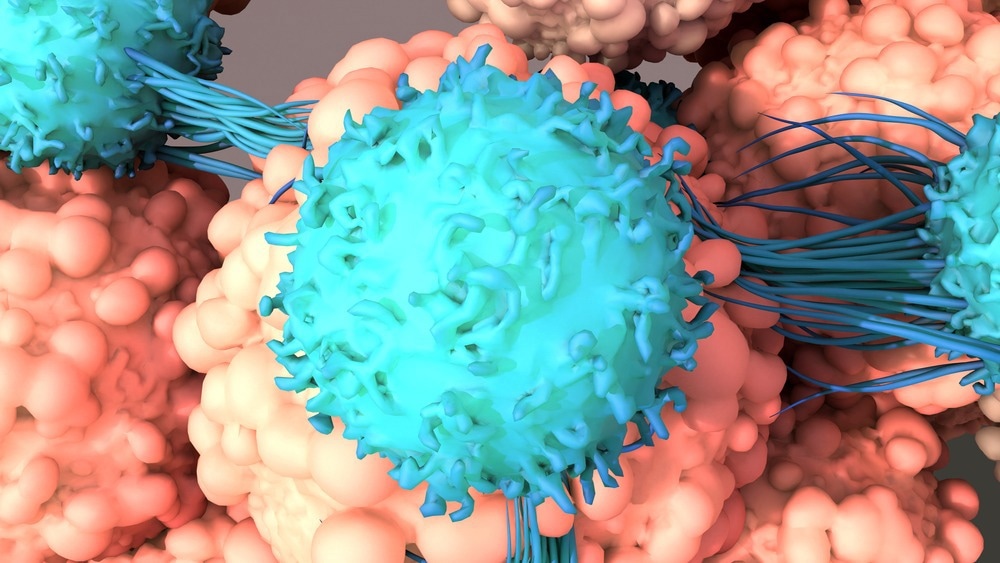Previous studies have reported an increased risk of severe coronavirus disease 2019 (COVID-19) outcomes among patients with advanced lymphoproliferative neoplasms on CAR‐T‐lymphocyte therapy due to B‐lymphocyte aplasia in these patients. However, data on the effectiveness of COVID-19 vaccination among patients on chimeric antigen receptor (CAR)‐T‐lymphocyte therapy are limited.

Study: Humoral Responses to Repetitive Doses of COVID‐19 mRNA Vaccines in Patients with CAR‐T‐Cell Therapy. Image Credit: Design_Cells / Shutterstock.com
About the study
In the present single-center retrospective study, researchers assess the immunogenicity of COVID-19 mRNA vaccines among patients on CAR-T-lymphocyte therapy at the University Hospital Inselspital of Switzerland.
The study consisted of 46 patients on CAR‐T‐lymphocyte therapy with predominantly diffuse large B‐cell lymphoma (DLBCL), B-acute lymphatic leukemia (B-ALL), mantle cell lymphoma. These patients received two to four doses of mRNA‐1273 or BNT162b2 vaccines from January 2021 to February 2022.
CAR‐T‐ and B‐lymphocyte levels were evaluated as prognostic indicators of humoral immune responses, as well as effects of the third and fourth vaccine doses on antibody-mediated humoral immunity.
COVID-19 vaccinees were categorized into two groups. For participants in group 1, which was referred to as the CAR‐T before VAC group, CAR‐T‐lymphocyte counts were measured before receipt of two to four vaccine doses.
For group 2, which was referred to as the CAR‐T after VAC group, CAR‐T-lymphocyte levels were measured after receipt two vaccine doses. The third and fourth vaccine doses were administered after CAR‐T-lymphocyte therapy.
Immunoglobulin G (IgG) antibody test reports of the participants were also compared following the second, third, and fourth doses of COVID‐19 mRNA vaccines. The immunogenicity of COVID‐19 vaccines was assessed based on IgG titers against the SARS‐CoV‐2 spike (S) protein subunits 1/2 (S1/S2) through the use of the indirect chemiluminescence immunoassays (CLIA). B-lymphocyte counts were measured by flow cytometry.
Lymphoid screening tube (LST) analysis was performed for certain samples, which included mature B-lymphocyte, T-lymphocyte, and natural killer (NK) lymphocyte populations. Notably, this analysis was inclusive of B-lymphocyte antigens such as the cluster of differentiation 19 (CD19), skappa, CD20, and slambda.
Study findings
The median ages of the study participants at the time of diagnosis and CAR‐T‐lymphocyte therapy were 58.5 years and 64 years, respectively. The ratio of men to women was 1.6.
The initial diagnoses of the patients were de novo DLBCL, transformed DLBCL, mantle cell lymphoma, and B‐ALL for 52%, 24%, 15%, and 9% of patients, respectively.
Autologous and allogeneic stem cell transplantations had been conducted before CAR‐T‐lymphocyte therapy in 46% and 2% of the participants, respectively. Regarding CAR-T-lymphocyte therapy, 61% of patients received tisagenlecleucel, 22% received axicabtagene ciloleucel, and 17% received brexucabtagen autoleucel.
Out of the total study cohort, 65% suffered from cytokine release syndrome and 26% suffered from CAR‐T‐related encephalopathy syndrome. Over 46% of patients received tocilizumab, whereas 35% received steroids. Relapse after CAR‐T‐lymphocyte therapy was reported in 22% of patients, whereas death was reported in three patients during follow‐up.
Among group 1 vaccinees, 23% and 39% exhibited positive antibody test results following double and triple vaccination, respectively. In addition, 100% of vaccinees showed positive antibody responses after receiving a fourth vaccine dose.
The third vaccine dose led to 24% seroconversion, whereas the fourth vaccine seroconverted 66% of participants. Greater B‐lymphocyte counts with an area under the curve (AUC) value of 96%, as well as CAR‐T‐lymphocyte counts with AUC of 77%, were prognostic of positive antibody-mediated humoral responses post-vaccination.
Among group 2 vaccinees, 43% and 37.5% exhibited positive antibody results after the second and third vaccine doses, respectively. In addition, 75% of participants showed positive antibody results after the fourth vaccine dose. The third vaccination led to 12.5% seroconversion, whereas the fourth dose seroconverted 75% of participants.
Out of 14 patients, three of the CAR‐T after VAC participants were SARS-CoV-2-infected, all of whom were SARS-CoV-2-positive after double COVID-19 vaccination. Only one SARS-CoV-2-infected patient exhibited a strong antibody positive result with antibody titers exceeding 100 AU/mL following the second COVID-19 vaccine dose.
Conclusions
The study findings demonstrate a greater likelihood of patients with higher B‐lymphocyte counts and lower CAR‐T‐lymphocyte counts to elicit positive antibody test results against COVID-19 following vaccination.
The humoral immune responses among the study participants were very poor; however, the rates of seroconversion improved after additional vaccine doses. More specifically, the third and fourth vaccine doses increased seroconversion rates, whilst high B‐cell counts and low CAR‐T‐cell copy numbers were associated with positive antibody responses.
Journal reference:
- Gössi, S., Bacher, U., Haslebacher, C., et al. (2022). Humoral Responses to Repetitive Doses of COVID‐19 mRNA Vaccines in Patients with CAR‐T‐Cell Therapy. Cancers 14(14). doi:10.3390/cancers14143527.